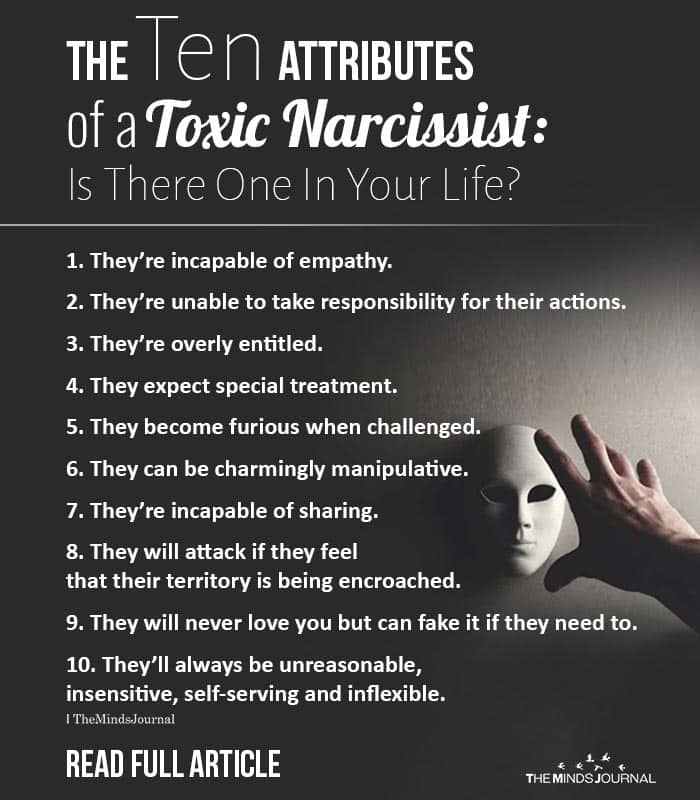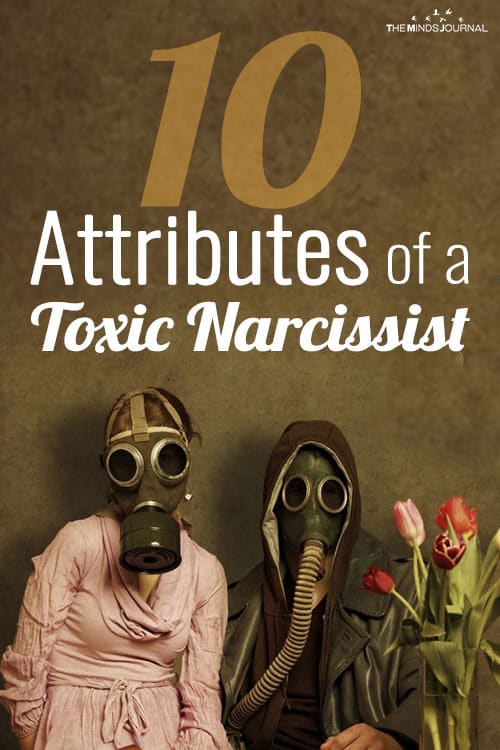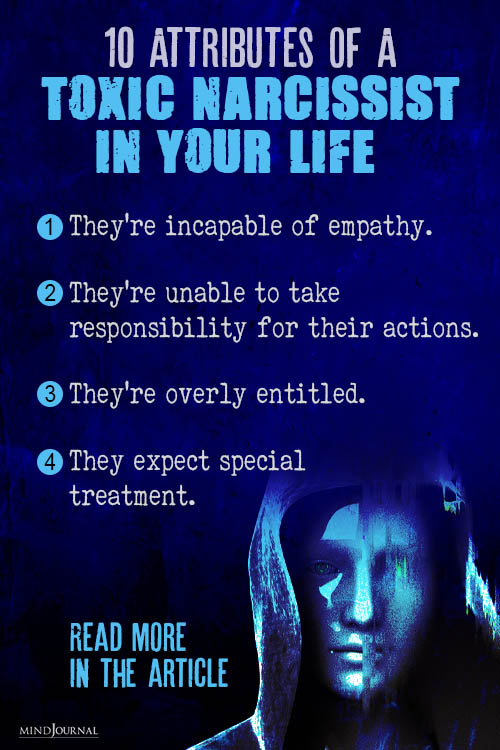Narcissism is far more complex than just vanity. Here are ten toxic narcissist signs and how you can identify their potentially toxic behavior.
Narcissists are everywhere.
They’re in your workplace, your school, and your community. They might even be in your home. Most narcissists are relatively harmless. They’re more selfish and self-serving than the average person, but they’re still capable of caring about others, which prevents them from doing too much harm.
Some narcissists, however, are toxic. They’re dangerous because they don’t play by the rules. They’ll lie, cheat, manipulate, threaten or attack in order to get what they want, with no concern about the casualties they leave in their wake. The only person they’ll ever care about is themselves.
It’s important to recognize the toxic narcissists in your life because they can do a lot of damage if you don’t identify them as soon as possible.
There are ten attributes of a toxic narcissist that everyone should be aware of. Knowing this might protect you from getting taken in by such a con artist, and hopefully, keep you from getting hurt.

10 Signs Of A Toxic Narcissist In Your Life
1. They’re incapable of empathy.
They may pretend to care but they’re constitutionally incapable of doing so. It doesn’t bother them if they hurt you; they can even believe that you deserve to be hurt, for example, if you’ve gotten in their way.
2. They’re unable to take responsibility for their actions.
They’re prepared to sink to depths you could never imagine, but they’ll always find a way to blame other people or make excuses for themselves. No matter how egregious their behaviour, it will never, ever be their fault.
In fact, when accused of wrong-doing, the toxic narcissist will become enraged and try to bully you into submission, or they’ll play the victim and accuse you of attacking them.
3. They’re overly entitled.
They feel like they have the right to do whatever they please, regardless of how others will be affected.
4. They expect special treatment.
They believe that they’re superior to the rest of us and deserve to be treated like royalty. Sadly, many people are taken in by their bloated over-confidence, believing that it must mean that they are special. They’re not. They’re just so convinced of their own hype that other people are taken in by it.
5. They become furious when challenged.
They become outraged when questioned or defied, and they’ll try to punish anyone who interferes with the pursuit of their goals. They don’t have the limits on their behaviour that normal people do, so their acts of retaliation can be extreme.
6. They can be charmingly manipulative.
They can be incredibly seductive but will turn to ice when you’re no longer useful. As long as you have something they want, they’ll pretend to care about you, but when you’ve outlived your purpose, you become irrelevant, perhaps even a liability.
If in the course of your acquaintance, you learn things about them that makes them feel vulnerable, you’re now a threat that needs to be silenced.
7. They’re incapable of sharing.
They see every person, object, opportunity or advantage in the world as a finite set of commodities to be consumed by them alone. If they perceive you as competing with them for this supposedly limited number of goods, they’ll project their own worst qualities onto you, and accuse you of being “selfish,” a “con artist,” or a “thief.” If you appear to be too much of a threat, they’ll do their best to cut you out of the competition.
8. They will attack if they feel that their territory is being encroached.
They always need to be in the position of greatest power. If you go head-to-head in competition with a toxic narcissist, whether it’s for a lover, a job, a political office, beware, because they’ll stop at nothing to win.
9. They will never love you but can fake it if they need to.
When they focus their high beams on you, you’ll feel like the most important person in their world, but it’s all an illusion. They’ll never do more than use you and when they’ve used you up, they can turn off their attention as abruptly as switching off a light.
For a toxic narcissist, being in a “relationship” is never about appreciating you for your unique qualities; it’s always about the advantage they gain by associating with you.
10. They’ll always be unreasonable, insensitive, self-serving and inflexible.
They’re cold-hearted, intractable, immensely greedy and supremely self-absorbed. If you have a problem with their shockingly bad behaviour, they’ll accuse you of being hysterical, of imagining things or of being cruel to them. They won’t listen to reason and you’ll never be able to make them change.
Knowing these things about a toxic narcissist should help you identify those in your midst and hopefully, protect you from being yet another casualty of their cruel selfishness.
Please sign up here for my free monthly wellness newsletter. April is all about becoming empowered in life.
And check out my new podcast series. In episode two I talk with filmmaker and activist Matthew McLaughlin about masculinity and self-acceptance.
Being with a toxic narcissist can be emotionally and mentally draining for anyone. Even though, you cannot change them, knowing the attributes of a toxic narcissist can help you understand them and deal with them better.
If you want to know more about the attributes of a narcissist, then you might find this interesting:
Originally appeared on Marcia Sirota MD
If you’re a people-pleaser and can’t stop being nice, Check out Marcia’s upcoming book:
Be Kind, Not Nice: How to Stop People-Pleasing, Build Your Confidence and Discover Your Authentic SelfPublication date: December 1, 2016, on Amazon.ca and Amazon.com















Leave a Reply